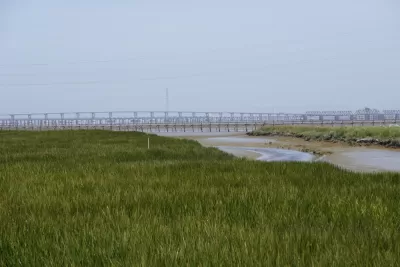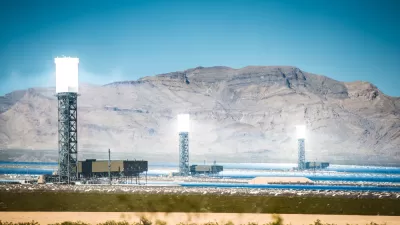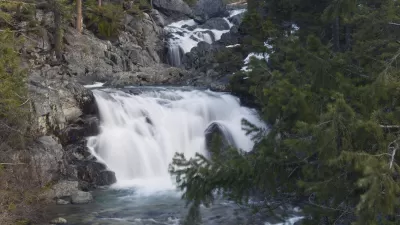Fulfilling a promise he made as a candidate, the Trump administration proposed a redefinition of what is classified as a wetland, with the result being the loss of federal protection of millions of acres of waterways and wetlands.

"The proposal, announced Tuesday at the Environmental Protection Agency, would change the EPA's definition of 'waters of the United States,' or WOTUS, limiting the types of waterways that fall under federal protection to major waterways, their tributaries, adjacent wetlands...," reports Nathan Rott for NPR. [Audio available on source article.] The rule is also referred to as the Clean Water Rule.
Targeted are streams and wetlands that do not flow year-round that were added in 2015 by the Obama administration after much controversy. "For years, Republican opponents, agriculture groups and real estate developers have decried that move as a regulatory overreach," notes Rott.
Under EPA's proposal, the only wetlands that will be federally protected are those that are adjacent to a major body of water, or ones that are connected to a major waterway by surface water.
If the new rule is approved and passes legal challenges, which are expected, the result would be loss of federal protection for "millions of acres of waterways and wetlands, including up to two-thirds of California’s inland streams," reports Evan Halper for the Los Angeles Times.
At stake are billions of dollars in potential development rights, the quality of drinking water for tens of millions of Americans and rules that affect farming in much of the country, as well as wildlife habitat for most of the nation’s migratory birds and many other species.
For example, Rott of NPR interviews Randy Noel, chairman of the National Association of Home Builders, who said the new proposal should make it easier for development to take place.
"As a home builder, I'm pretty excited about it because we hadn't had any lots to build on," he said.
Noel lives in south Louisiana, an area with a lot of wetlands. He says developers were running scared because it wasn't ever clear which wetlands were federally regulated and which weren't. "Hopefully this re-definition will fix that," he said.
On the opposing side, Rott speaks with Chris Wood, president of Trout Unlimited, a nonprofit group dedicated to conservation of streams and other habitats for trout. But it's not only fishing that has Wood concerned.
Wood said this rule could affect people's drinking water. For that reason, he said, "if need be and we find it deeply flawed enough, we will likely litigate."
Jon Devine, director of federal water policy for the Natural Resources Defense Council, adds in a statement:
"This proposal is reckless. Given the problems facing our lakes, streams and wetlands from the beaches of Florida to the drinking water of Toledo, now is the time to strengthen protections for our waterways, not weaken them.
On the PBS Newshour on Tuesday night, Coral Davenport, energy and environmental reporter for The New York Times (see her piece), tells anchor Judy Woodruff that the proposed revision extends beyond the Obama protections to those added under both Bush administrations.
Tuesday's proposal stems from an executive order in February 2017 (posted here). Click on the tag, "Waters of the United States Rule" for past coverage.
FULL STORY: Trump EPA Proposes Major Rollback Of Federal Water Protections

Alabama: Trump Terminates Settlements for Black Communities Harmed By Raw Sewage
Trump deemed the landmark civil rights agreement “illegal DEI and environmental justice policy.”

Study: Maui’s Plan to Convert Vacation Rentals to Long-Term Housing Could Cause Nearly $1 Billion Economic Loss
The plan would reduce visitor accommodation by 25% resulting in 1,900 jobs lost.

Planetizen Federal Action Tracker
A weekly monitor of how Trump’s orders and actions are impacting planners and planning in America.

Waymo Gets Permission to Map SF’s Market Street
If allowed to operate on the traffic-restricted street, Waymo’s autonomous taxis would have a leg up over ride-hailing competitors — and counter the city’s efforts to grow bike and pedestrian on the thoroughfare.

Parklet Symposium Highlights the Success of Shared Spaces
Parklets got a boost during the Covid-19 pandemic, when the concept was translated to outdoor dining programs that offered restaurants a lifeline during the shutdown.

Federal Homelessness Agency Places Entire Staff on Leave
The U.S. Interagency Council on Homelessness is the only federal agency dedicated to preventing and ending homelessness.
Urban Design for Planners 1: Software Tools
This six-course series explores essential urban design concepts using open source software and equips planners with the tools they need to participate fully in the urban design process.
Planning for Universal Design
Learn the tools for implementing Universal Design in planning regulations.
Caltrans
Smith Gee Studio
Institute for Housing and Urban Development Studies (IHS)
City of Grandview
Harvard GSD Executive Education
Toledo-Lucas County Plan Commissions
Salt Lake City
NYU Wagner Graduate School of Public Service





























